虚拟语气讲解与练习(可用)
高考英语虚拟语气练习及详解
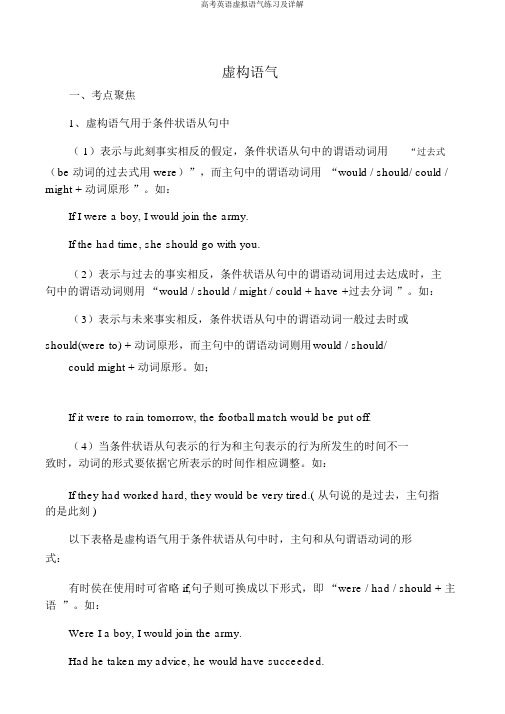
虚构语气一、考点聚焦1、虚构语气用于条件状语从句中( 1)表示与此刻事实相反的假定,条件状语从句中的谓语动词用“过去式(b e 动词的过去式用 were)”,而主句中的谓语动词用“would / should/ could / might + 动词原形”。
如:If I were a boy, I would join the army.If the had time, she should go with you.(2)表示与过去的事实相反,条件状语从句中的谓语动词用过去达成时,主句中的谓语动词则用“would / should / might / could + have +过去分词”。
如:(3)表示与未来事实相反,条件状语从句中的谓语动词一般过去时或should(were to) + 动词原形,而主句中的谓语动词则用would / should/ could might + 动词原形。
如;If it were to rain tomorrow, the football match would be put off.(4)当条件状语从句表示的行为和主句表示的行为所发生的时间不一致时,动词的形式要依据它所表示的时间作相应调整。
如:If they had worked hard, they would be very tired.( 从句说的是过去,主句指的是此刻 )以下表格是虚构语气用于条件状语从句中时,主句和从句谓语动词的形式:有时侯在使用时可省略 if,句子则可换成以下形式,即“were / had / should + 主语”。
如:Were I a boy, I would join the army.1/14Were it not for the expense, I would go to .2、虚气用于名性从句( 1)虚气在从句中的运用。
①“ wish + 从句”表示不可以的梦想,“假如⋯⋯就好了”等。
高中英语 虚拟语气讲解及练习(有答案)
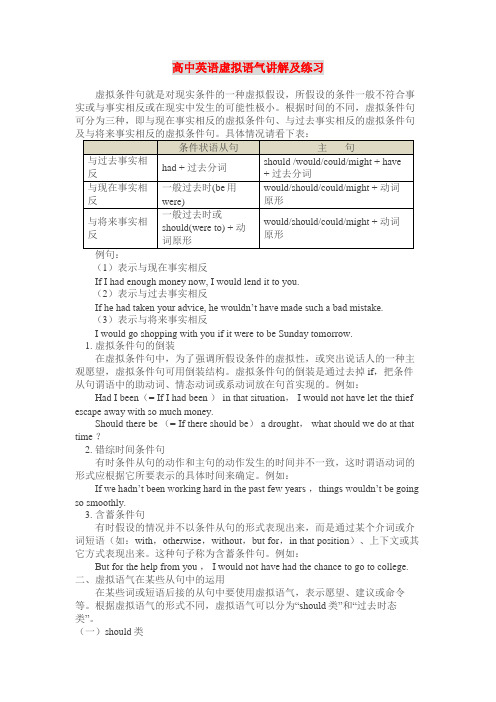
高中英语虚拟语气讲解及练习虚拟条件句就是对现实条件的一种虚拟假设,所假设的条件一般不符合事实或与事实相反或在现实中发生的可能性极小。
根据时间的不同,虚拟条件句可分为三种,即与现在事实相反的虚拟条件句、与过去事实相反的虚拟条件句(1)表示与现在事实相反If I had enough money now, I would lend it to you.(2)表示与过去事实相反If he had taken your advice, he wouldn’t have made such a bad mistake.(3)表示与将来事实相反I would go shopping with you if it were to be Sunday tomorrow.1. 虚拟条件句的倒装在虚拟条件句中,为了强调所假设条件的虚拟性,或突出说话人的一种主观愿望,虚拟条件句可用倒装结构。
虚拟条件句的倒装是通过去掉if,把条件从句谓语中的助动词、情态动词或系动词放在句首实现的。
例如:Had I been(= If I had been ) in that situation, I would not have let the thief escape away with so much money.Should there be (= If there should be) a drought, what should we do at that time ?2. 错综时间条件句有时条件从句的动作和主句的动作发生的时间并不一致,这时谓语动词的形式应根据它所要表示的具体时间来确定。
例如:If we hadn’t been working hard in the past few years ,thing s wouldn’t be going so smoothly.3. 含蓄条件句有时假设的情况并不以条件从句的形式表现出来,而是通过某个介词或介词短语(如:with,otherwise,without,but for,in that position)、上下文或其它方式表现出来。
虚拟语气 详解+练习
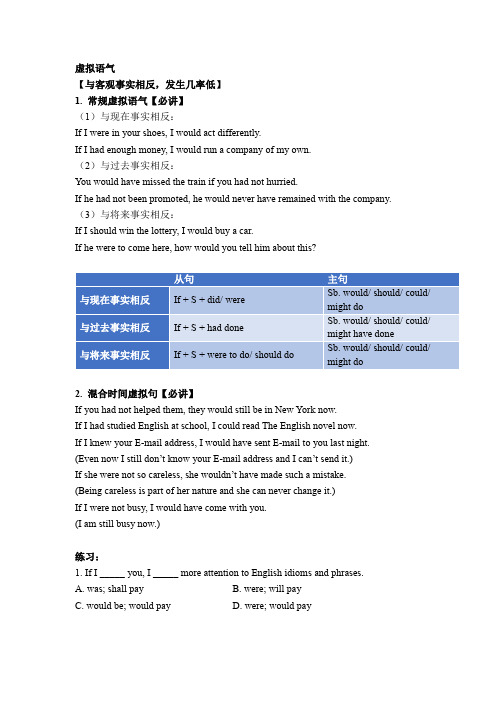
虚拟语气【与客观事实相反,发生几率低】1. 常规虚拟语气【必讲】(1)与现在事实相反:If I were in your shoes, I would act differently.If I had enough money, I would run a company of my own.(2)与过去事实相反:You would have missed the train if you had not hurried.If he had not been promoted, he would never have remained with the company.(3)与将来事实相反:If I should win the lottery, I would buy a car.If he were to come here, how would you tell him about this?2. 混合时间虚拟句【必讲】If you had not helped them, they would still be in New York now.If I had studied English at school, I could read The English novel now.If I knew your E-mail address, I would have sent E-mail to you last night. (Even now I still don’t know your E-mail address and I can’t send it.)If she were not so careless, she wouldn’t have made such a mistake.(Being careless is part of her nature and she can never change it.)If I were not busy, I would have come with you.(I am still busy now.)练习:1. If I _____ you, I _____ more attention to English idioms and phrases.A. was; shall payB. were; will payC. would be; would payD. were; would pay2. It would have been just as satisfactory if I ______ at home. I learned nothing in class.A. had stayedB. stayedC. was stayingD. would stay3. We didn’t know his telephone number, otherwise we ______ him.A. would have telephonedB. must have telephonedC. would telephoneD. had telephoned4. You did not let me drive. If we ____in turn, you ____ so tiredA. drove; didn’t getB. drove; wouldn’t getC. were driving; wouldn’t getD. had driven; wouldn’t have got3. 倒装虚拟句【难句必讲内容,语法课视学生水平和时间条件选讲】Had he not been promoted, he would never have remained with the company. Should I win the lottery, I would buy a car.Were he to leave today, he would get there by Monday.If I had money, …不能倒装成:Had I money, …练习:1. Had Paul received six more votes in the last election, he ______ our chairman now.A. must have beenB. would have beenC. wereD. would be2. ______ for the timely investment from the general public, our company would not be so thriving as it is.A. Had it not beenB. Were it notC. Be it notD. Should it not be3. ______ before we depart the day after tomorrow, we should have a wonderful dinner party.A. Had they arrivedB. Were they arrivingC. Would they arriveD. Were they to arrive4. There is a real possibility that these animals could be frightened, ______ a sudden loud noise.A. being thereB. should there beC. there wasD. there having been4. 含蓄虚拟句【选讲】①But for要不是+ N;but that + 句子But for their help, I would not have finished the task.But for the sun, there could be no life on the earth.But that the doctor arrived on time that day(不用虚拟), they would have been dead. (用虚拟) —— 改成ifBut that he needed money desperately, he would never have turned to his brother for help. ——改成if②If it were not for…要不是If it had not been for…要不是【托福阅读中出现过,难句内容】a. If it were not for…对现在虚拟If it had not been for…对过去虚拟b. for + 词组c. 倒装形式were it not for…/ had it not been for____________ the sun, there could be no life on earth.A. Were it not forB. If it were notC. Were it notD. But that【说话人对于听话人的主观意志影响】5. 一坚持、二命令、三建议、四要求【必讲】insist; order, command; advise, suggest, propose; ask, demand, require, requestThe general ordered that his troops (should) move on to the front.They require that visitors (should) not smoke in the workshop.补充:beg, decide, determine, move, prefer, recommend, urge, desireHis father urged that he study medicine.注意:suggest “暗示,说明”, insist “坚持认为”用直陈式His puzzled expression suggested that he didn’t understand.I insisted that I had taken the early train that morning.练习:1. Jane’s pale face suggested that she ________ill, and her parents suggested that she _______ a medical examination.A. be; should haveB. was; haveC. should be; hadD. was; has2. The young man insisted that he________ nothing wrong and_________ free.A. did; setB. had done; should be setC. do; be setD. had done; must be set3. Some insisted that we_______ an English evening at weekend, yet some insisted that they _______ no interest in it at all.A. should hold; takeB. were going to hold; showC. hold; tookD. would hold; would show十个动词相对应的名词His suggestion is that we (should) climb all the way to the top of the hill.He made the suggestion that we (should) climb all the way to the top of the hill.6. It is + 形容词或过去分词或特定的名词+ that…【服务于写作,必讲】It is essential that people be psychologically able to resist the impact brought about by the transition from planned economy to market economy.It is necessary that a high school student (should) master a foreign language.It is important that we (should) have a good knowledge of history and geography.It is natural that I should dwell upon his successes rather than upon his failures.It is usual that ...It is requested that all members be present at the meeting.It is my proposal that he be sent to study further abroad.常见形容词:advisable, appropriate, crucial, desirable(可取的), imperative, urgent, vital, normal, proper, preferable7. It is a pity / strange / surprising / no wonder that…【选讲】从句谓语动词用虚拟语气should do (should不可省略),表遗憾、惊奇、怀疑、不满或欣慰等语气。
虚拟语气讲解及专项练习题
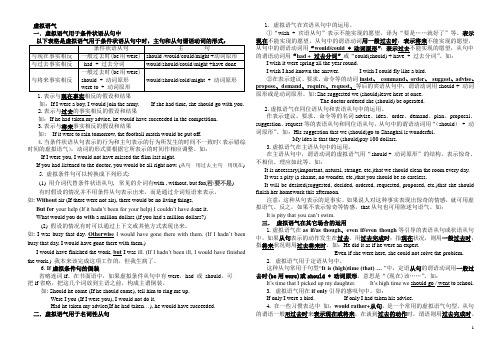
虚拟语气一.虚拟语气用于条件状语从句中1.表示与现在事实相反的假设和结果如:If I were a boy, I would join the army. If she had time, she should go with you.2.表示与过去的事实相反的假设和结果如:If he had taken my advice, he would have succeeded in the competition.3.表示与将来事实相反的假设和结果如: If it were to rain tomorrow, the football match would be put off.4.当条件状语从句表示的行为和主句表示的行为所发生的时间不一致时(表示错综时间的虚拟语气),动词的形式要根据它所表示的时间作相应调整。
如:If I were you, I would not have missed the film last night.If you had listened to the doctor, you would be all right now. (从句---用过去,主句---用现在)5. 虚拟条件句可以转换成下列形式:(1)用介词代替条件状语从句, 常见的介词有with , without, but for(若/要不是)有时假设的情况并不用条件从句表示出来,而是通过介词短语来表示。
如: Without air (If there were not air), there would be no living things.But for your help (If it hadn’t been for your help) I couldn’t have do ne it.What would you do with a million dollars (if you had a million dollars?)(2) 假设的情况有时可以通过上下文或其他方式表现出来。
(完整版)虚拟语气倒装(讲解+练习)

虚拟语气有些条件句是可能实现的,称为真实条件句. 虚拟语气是动词的一种特殊形式,用来表达说话人的意愿.请求,设想,等未能或不可能实现的事实,或说话人看来实现可能性很小的情况.做这类题时首先要弄清楚虚拟语气的各种句型,即由if引导的虚拟条件句,省略if的倒装形式,可跟虚拟语气的宾语从句,同位语从句,表语从句的句型,以及表示祝愿或感叹的句子和由without, but for等介词引导的短语或句子.主要用法1). 主语从句,同位语从句中虚拟语气的用法.2). 宾语从句中虚拟语气的用法,尤其是wish 虚拟语气结构的用法.3). If条件句中虚拟语气的用法,应特别注意省略if的倒装结构是考试的重点.4). would rather(=wish)等结构中虚拟语气的用法.5). if only(如果。
就好了)结构中虚拟语气的用法.6). But, or, otherwise 等含蓄条件句的用法.7). It’s time (that)(早该。
)等结构中虚拟语气的用法.1. 虚拟语气在虚拟条件句中的运用(1) 虚拟语气现在时,用以表示与现在/将来事实相反的假设或现在实现可能性不大的情况.Eg. If I were a bird, I would fly to you.If it is not for their help, we shall be in a very difficult position.If it were not for their help, we should be in a very difficult position.If I had seen the film, I would…..(2) 虚拟语气过去式. 表示与过去事实完全相反的假设.Eg. If we had started earlier, we should not have missed the train.If she hadn’t been ill, she might have come.If she were not ill, she might come.◆书面语中,如果从句里含有should, had, were或其他助动词,则可将从属连词if省去,将助动词.情态动词.be或have放在句首形成部分倒装.Eg.Were he in your position,he’d do the same.If he Were in your position,he’d do the same.Had I had time, I would have done that yesterday.If I Had had time, I would have done that yesterday.If he Should (万一)come tomorrow, I should give him the dictionary.(3) 虚拟语气在某些从句中的应用.A)在(表现了说话人的愿望)wish, suggest, order, demand, propose,command, request, recommend, require, decide, insist, desire,urge等动词的宾语从句(should:应该) + 动词原形.以及would rather /sooner that后要用“ (should:应该) + 动词原形” 来表示愿望,建议,命令,要求等;由上述动词派生或转化的名词suggestion, proposal, plan,motion, recommendation, demand, order, desire, request,requirement, insistence, advice, decision , obligatory(义不容辞的,必须的同位语从句或表语从句中也要用相应的虚拟形式.Eg. His suggestion was that we (should) go at once.Wang insisted that we go at once.B)在It is/was + 某些形容词 + that (表现了说话人的愿望)从句的句型中,that从句中的谓语动词常用虚拟语气,即“should + 动词原形”这些形容词有:important, necessary, essential, imperative, natural, strange,advisable, desirable, possible, probable, astonishing,surprising, desired, suggested, requested, recommended,ordered, proposed, decided, moved等.C) “ should(居然/竟然) + 动词原形(或完成形式)” 可表示惊奇,遗憾,怀疑,不满等.ⅰ. 用于expect, believe, think, suspect 等动词的否定或疑问形式后的宾语从句中.Eg. I never expected that the new apartment should be so small.ⅱ. 用于“It is a pity, it is a shame, it is no wonder 等+ that”等结构后的主语从句中.Eg. It is a pity that he should be so careless.D) 在由for fear that, in case, lest 等引导的状语从句中,用“ should (万一)+ 动词原形” 表示“惟恐”的意思.Eg. He handled the instrument with care for fear that it should be damaged.E) 在“ It is (about/ high ) time + that (从句)(早就应该)” 中,谓语动词常用过去式表表示虚拟语气.Eg. It is high time that Chinese people learnt English.F) 在“as if/ as though”(似乎/好像) 引导的状语从句中,谓语动词与wish的宾语从句的虚拟形式相同.Eg. He w ork s with such enthusiasm as if he never knew fatigue. He speaks English as though he were an American.G) 在 look/sound/feel/ seem + as if / as though从句中,当表示真实情况时,用陈述语气; 否则,用虚拟语气.Eg.It seems as if they know each other. (真实情况)It seems as if they knew each other.It seems as though it were already spring. (虚拟语气)H) 用在if only(如果。
初中虚拟语气讲解及专项练习与答案(带解析)
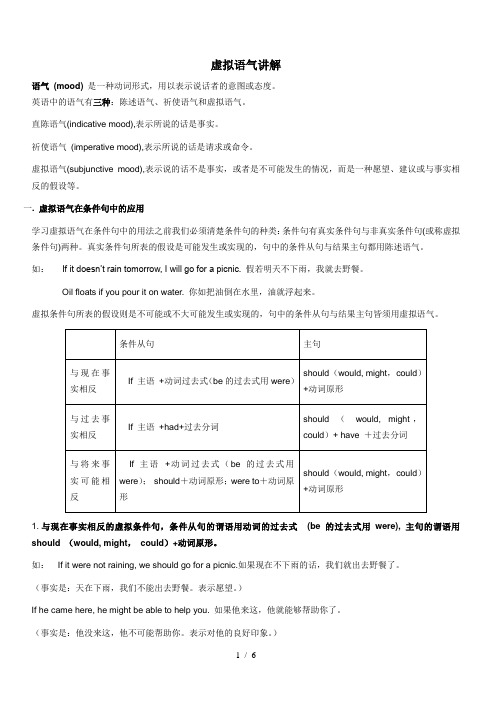
虚拟语气讲解语气(mood) 是一种动词形式,用以表示说话者的意图或态度。
英语中的语气有三种:陈述语气、祈使语气和虚拟语气。
直陈语气(indicative mood),表示所说的话是事实。
祈使语气(imperative mood),表示所说的话是请求或命令。
虚拟语气(subjunctive mood),表示说的话不是事实,或者是不可能发生的情况,而是一种愿望、建议或与事实相反的假设等。
一. 虚拟语气在条件句中的应用学习虚拟语气在条件句中的用法之前我们必须清楚条件句的种类:条件句有真实条件句与非真实条件句(或称虚拟条件句)两种。
真实条件句所表的假设是可能发生或实现的,句中的条件从句与结果主句都用陈述语气。
如:If it doesn’t rain tomorrow, I will go for a picnic. 假若明天不下雨,我就去野餐。
Oil floats if you pour it on water. 你如把油倒在水里,油就浮起来。
虚拟条件句所表的假设则是不可能或不大可能发生或实现的,句中的条件从句与结果主句皆须用虚拟语气。
1. 与现在事实相反的虚拟条件句,条件从句的谓语用动词的过去式(be的过去式用were), 主句的谓语用should (would, might,could)+动词原形。
如:If it were not raining, we should go for a picnic.如果现在不下雨的话,我们就出去野餐了。
(事实是:天在下雨,我们不能出去野餐。
表示愿望。
)If he came here, he might be able to help you. 如果他来这,他就能够帮助你了。
(事实是:他没来这,他不可能帮助你。
表示对他的良好印象。
)2. 与过去事实相反的虚拟条件句,条件从句的谓语用had+过去分词,主句的谓语用should (would, might,could)+ have +过去分词。
高中英语虚拟语气讲解及练习题(附答案)
高中英语虚拟语气讲解及练习虚拟条件句就是对现实条件的一种虚拟假设,所假设的条件一般不符合事实或与事实相反或在现实中发生的可能性极小。
根据时间的不同,虚拟条件句可分为三种,即与现在事实相反的虚拟条件句、与过去事实相反的虚拟条件句(1)表示与现在事实相反If I had enough money now, I would lend it to you.(2)表示与过去事实相反If he had taken your advice, he wouldn’t have made such a bad mistake.(3)表示与将来事实相反I would go shopping with you if it were to be Sunday tomorrow.1. 虚拟条件句的倒装在虚拟条件句中,为了强调所假设条件的虚拟性,或突出说话人的一种主观愿望,虚拟条件句可用倒装结构。
虚拟条件句的倒装是通过去掉if,把条件从句谓语中的助动词、情态动词或系动词放在句首实现的。
例如:Had I been(= If I had been ) in that situation, I would not have let the thief escape away with so much money.Should there be (= If there should be) a drought, what should we do at that time ?2. 错综时间条件句有时条件从句的动作和主句的动作发生的时间并不一致,这时谓语动词的形式应根据它所要表示的具体时间来确定。
例如:If we hadn’t been working hard in the past few years ,thing s wouldn’t be going so smoothly.3. 含蓄条件句有时假设的情况并不以条件从句的形式表现出来,而是通过某个介词或介词短语(如:with,otherwise,without,but for,in that position)、上下文或其它方式表现出来。
高中英语虚拟语气详解及练习(含答案)
高中英语虚拟语气讲解及练习虚拟条件句就是对现实条件的一种虚拟假设,所假设的条件一般不符合事实或与事实相反或在现实中发生的可能性极小。
根据时间的不同,虚拟条件句可分为三种,即与现在事实相反的虚拟条件句、与过去事实相反的虚拟条件句(1)表示与现在事实相反If I had enough money now, I would lend it to you.(2)表示与过去事实相反If he had taken your advice, he wouldn’t have made such a bad mistake.(3)表示与将来事实相反I would go shopping with you if it were to be Sunday tomorrow.1. 虚拟条件句的倒装在虚拟条件句中,为了强调所假设条件的虚拟性,或突出说话人的一种主观愿望,虚拟条件句可用倒装结构。
虚拟条件句的倒装是通过去掉if,把条件从句谓语中的助动词、情态动词或系动词放在句首实现的。
例如:Had I been(= If I had been ) in that situation, I would not have let the thief escape away with so much money.Should there be (= If there should be) a drought, what should we do at that time ?2. 错综时间条件句有时条件从句的动作和主句的动作发生的时间并不一致,这时谓语动词的形式应根据它所要表示的具体时间来确定。
例如:If we hadn’t been working hard in the past few years ,thing s wouldn’t be going so smoothly.3. 含蓄条件句有时假设的情况并不以条件从句的形式表现出来,而是通过某个介词或介词短语(如:with,otherwise,without,but for,in that position)、上下文或其它方式表现出来。
虚拟语气讲解以及练习
虚拟语气的用法一、非真实条件句1. 虚拟语气可以表示过去,现在和将来的情况,时态的基本特点是时态往后推移有时,主句与从句的动作发生在不同的时间,主句从句谓语动词的虚拟语气形式因时间不同而不同,这种条件句叫做混合条件句If you had asked him yesterday, you would know what to do now. 如果你昨天问过他,今天就知道做什么了。
(从句与过去事实相反,主句与现在事实相反。
)1. If it had rained last night(过去), it would be very cold today (现在).如果昨晚下过雨,今天就会很冷了。
2. If you’d listened to me , you wouldn’t be in such trouble now . 如果你听了我的话,你现在也不会这样麻烦了3. If it hadn’t been for her care , I should not be speaking to you now. 要不是她照顾我,我也不会在这里和你讲话4. If the doctor had come in time , Amy would still be alive . 如果医生及时赶到,AMY现在还活着。
三、含蓄条件句:含蓄条件句是指非真实条件句中的条件从句有时不表出来,只暗含在上下文中。
常见的表达方式有:1. 介词及介词短语 but for, without , with ,等But for his pension , he would starve .要不是有养老金,他都要饿死了Without your help , I couldn’t have achieved all this . 要不是有你帮助我不会取得这些成就With his aid , you would succeed . 如果有了他的帮助,你就会成功。
虚拟语气讲解与练习
虚拟语气第一部分知识讲解虚拟语气存在于if条件从句中和一些固定结构中,虚拟语气与动词的过去的某种时态形影不离; 虚拟语气是通过谓语动词的变化来实现的;第一节 if 条件状语从句中的虚拟语气一、if 条件状语从句中表示对将来、过去、现在的虚拟If she invites me tomorrow, I shall go to the party.真实条件句如果她明天邀请我参加聚会,我就去.If she invited me, I should go to the party.虚拟条件句说话人认为邀请的可能性较小或不可能If I were you, I should study English. I am not you , so I shall not study English.If I had time, I would attend the wedding. I does not have time, so I will not attend the wedding.You did not take my advice, so you have failed in the examination.If it should rain tomorrow, our picnic would be put off.If it were to rain tomorrow, our picnic would be put off.二、混合虚拟语气条件状语从句表示的行为和主句表示的行为所发生的时间不一致时,动词的形式要根据它所表示的时间来调整.If you had worked hard, you would be very tired. 从句说的是过去,主句指的是现在If he had followed the doctor’s advice, he would be quite all right nowIf I were you, I would have gone home.If you had practiced speaking English every day, you would speak English well enough.如果你当初每天都练习说英语的话,你的英语就会说得很好.三.用介词短语代替条件状语从句可以改为条件状语从句Without air, there would be no living things.相当于:If there were no air, there would be no living things.But for your help, I couldn’t have done it.相当于:If you had not helped me, I couldn’t have done it.四、虚拟语气的倒装:如果条件状语从句的谓语中有were, had或should,就可以倒装;将were, had或should放到句首,谓语主语之前, if去掉; 变为”were/had/should+主语”的形式;如果从句没有were, had或should,就不能倒装;If I were to do it, I’d do it some other way.→ Were I to do it, I`d do it some other way.If you should fail, try again.→ Should you fail, try again.If you had been here earlier, you would have seen him.→ Had you been here earlier, you would have seen him.If you came tomorrow, we would have the meeting.这句话不能倒装.而且,在虚拟条件状语从句中,省略了if的倒装形式的句首不能用动词的缩略形式.如:Were it not for the expense, I would go to Italy.但不能说: Weren`t it for the expense, I would go to Italy.第二节固定结构中的虚拟语气一、.It ishigh timethat……句型中的虚拟语气在此句型中,后面的从句的谓语动词常用过去式,.意思为“现在该……的时候了”It is high time that you got married. It is high time that I lost some weight.二、.wish+宾语从句结构I wish it were Spring all the year round. I wish I were Jane.I wish you could go with us. We wish we had arrived there two hours earlier.三.If only句中的虚拟语气If only he were hereIf only I knew moreIf only he had stayed with usIf only I had taken his advice注:if only也可以用于虚拟条件句中;例如:If only I had more money, I could buy a car.四、在would just as soon 宁愿would sooner 宁愿would just rather 宁愿后的宾语从句中,从句谓语用一般过去时来表示现在或将来要做的事情,若谈及过去的动作,用过去完成时;其后不加that;.I`d rather I were in the rain now.Don’t always make noise. I’d rather you kept silent.五、在in case, for fear that, lest等引导的状语从句中,意为“以免”,从句要用虚拟语气;构成should+动词原形,should也可以省略;Take an umbrella with you in case it should rain.六、as if/as though或even if/even though引导的从句中的虚拟语气如果从句中表示的动作发生在过去,则谓语动词用had+过去分词形式;如果指的是现在的状况,则用过去式;指将来则用wouldshould, could+动词原形.这里只看从句动作发生的时间,与主句的时态没有关系. Some metals look at first sight as though they were gold.When a pencil is partly in a glass of water, it looks as if it were broken.She looks as if/though she were ill.He would not resign even if the heaven should collapse.倒塌七.在表示建议,要求,命令等意思的动词request, require, demand, advise, suggest, propose, recommend, command, order , desire, insist,后面的宾语从句中, 谓语动词用should+动词原形,should可以省略,that不能省略.He suggested that we should have a meeting.The commander ordered that the bridgeshould be bombed.八.与表示请求,建议,命令等动词相对应的名词后面的表语从句,同位语从句用虚拟语气.suggesttion,command,demand,desire,request,requirement,insist,advice,propose,order.Our suggestion is that education not be industrialized.表语从句==We suggested that education not be industrialized.He made a request that heshould be allowed to take 3 days off.==He requested that he be allowed to take 3 days off.九.表示建议,请求,命令动词在以下结构中主语从句“It is suggested/ required/ request/ ordered/ advised/ insisted/ demanded that……”用虚拟语气.It was suggested that he should attend the conference.It was requested that the trial should be reported openly.十.在以下结构中主语从句It is important/ necessary/ strange/ desirable/ advisable/ better/essential/ vital / imperative必须的that…句型中.that引导的从句用虚拟语气,should 可以省略,that不能省略.It is essential that there should be enough food and clothing for the winter;It is desirable that your wedding be postponed until next July.第二部分虚拟语气练习题一、if条件句中表示对过去的虚拟1. ________, he would have come to class.A If Mike is able to finish his homeworkB Would Mike be able to finish his homeworkC If Mike could finish his homeworkD If Mike had been able to finish his homework2. __________your advice yesterday, I would have missed the train.A Had I not takenB If I didn`t takeC If I haven`t takenD Provided I didn`t take3. He ____________ killed last night if he had taken part in the surprise attack on the night.A .might beB would beC might have been D. should have been4. If he had been in better health, he ____________more books.A. can writeB. could have writtenC. could writeD. have written, everything would have been all right.A. He had been hereB. Been here he hadC. Here he had beenD. Had he been here二、混合虚拟语气6. I ________ a little earlier, but I met a friend of mine on the way.A. should arriveB. would be arrivingC. could have arrivedD. arrived三、用介词短语without, but for代替条件状语从句7. ________ your help, I could not have finished my work so early.A withB byC forD without8. Without his wise mother, he _________ such a successful scientist.A. would not becomeB. should not have becomeC. may not have becomeD. could not have become四、It’ s high/abouttime结构9. It’s time the dog __________ how to behave prop erly.A is learningB learnsC learned D. to learn10. It’s high time you _________ the problem carefully about what you will do in the future.A are studiedB must studyC studied D. study11. It’s high time we_______ something to stop road accidents.A are doingB didC will do D. do12. It’s high time __________ about the traffic problem.A. something were doneB. something is doneC. anything will be doneD. nothing to be done五、在wish+宾语从句中13. I wish you __________here last night. All of us were waiting for your arrival.A. cameB. had comeC. comeD. will come六、在would just rather, would just as soon ,would sooner宁愿结构中14. I’d just as soon __________those important papers with you.A. that you won’t takeB. your not taking C please don’t you take D. you didn’t take15. Mr. Smith would just rather we__________ now , but we must go to work.A. not leave B didn’t leave C are not to leave D won’t leave16. I would rather you _____ to the party with her.A goB wentC will goD has gone七、在表示建议,请求,命令的宾语从句中17. Experiments __________that accurate measurements be made.A. showB. proveC. demandD. head18. The teacher insisted that we our homework before 9:00 o’clock.A. finishedB. had finishedC. finishD. was finishing八、表示建议,请求,命令,坚持等同位语、表语从句中的虚拟语气19. One of the requirements for a fire is that the material _______ to its burning temperature.A. is heatedB. will be heatedC. be heatedD. would be heated20. We are all for your proposal that the discussion__________.A. be put offB. was put offC. will be put offD. should put off九、主语从句21. It is requested that the rent for the house _________ in advance.A. will have to be paidB. has to be paidC. should have to be paidD. should be paid22. It is very important that enough money_________ to fund the project .A. be collectedB. must be collectedC. is collectedD. can be collected23. It is necessary that the problem __________ in some way or other.A. is settledB. has been settledC. be settledD. was settled第三部分补充练习1. If you _______5 minutes earlier, you ________ him.A. should come; had seenB. came; would seeC. come; will seeD. had come; would have seen2. He hesitated for a moment before kicking the ball, otherwise he __ a goal.A. had scoredB. scoredC. would scoreD. would have scored3. It is strange that Mr. Zhang ______ such silly mistakes.A. madeB. makesC. makeD. had made4. They demanded that the books ______ to the school library at once.A. returnB. should returnC. be returnedD. would be returned5. How I wish every family _____ a large house with a beautiful gardenA. hasB. hadC. will haveD. had had6. It is high time that we _______ to think how to deal with the money.A. would beginB. beganC. beginD. begun7. If only he _______ quietly as the doctor instructed, he would not suffer so much now.A. liesB. layC. had lainD. should lie8. If I had had enough time, I _______ my work.A. would finishB. must have finishedC. would have finishedD. had finished9. Ten minutes earlier, they ________ the plane.A. will catchB. would catchC. would have caughtD. will have caught10. Mr. Green requires that the students ________ a composition every other week.A. writeB. writtenC. would writeD. will write11. Had he studied hard, he ______ the exam.A. would passB. could passC. had passedD. would have passed12. I wish I _______ what is happening there in this room.A. knowB. knownC. knewD. should know13. If there were no water in the world, everything __________.A. will dieB. would dieC. would have diedD. would have been dead14. _______ what was going to happen, I would never have left her alone.A. Had I knownB. If I knowC. If I knewD. If had I known15. He ordered that the work ________ right away.A. should finishB. finishedC. would be finishedD. be finished16. ---Shall we go to the movie tonight--- No, I’d rather____at home with our baby. You’d better not leave it to the babysitter at night.A. you stayedB. you stayC. stayedD. stay17. Mrs. Black insists _______ in that old hotel.A. not to stayB. not stayingC. staying notD. that she not stay.18. If you had spoken clearly, you would ________ .A. understand itB. have understoodC. be understoodD. have been understoodyou _______ that late movie last night, you wouldn’t be so sleepy.A. haven’t watchedB. hadn’t watchedC. didn’t watchD. wouldn’t have watchedelectronic computers, much of today’s advanced technology __________ achieved.A. will not beB. would not beC. would not have beenD. cannot have beendidn’t let me drive. If we ______ in turn. You _______ so tired.A. drove, didn’t getB. drove, wouldn’t getC. were driving, wouldn’t getD. had driven, wouldn’t have got22. Wouldn’t you rather that your child ______ to bed earlyA. goB. wentC. would goD. goesfor the traffic jam, we _______ on time.A. arrivedB. would arriveC. will have arrivedD. would have arrived24 My suggestion is that he _______ there at once.A. should sendB. would sendC. be sentD. sentonly we ________ about the danger, we could not have joined you.A. knewB. had knownC. should knowD. knowdidn’t see your sister at the meeting. If she ______, she would have met my br other.A. has comeB. did comeC. cameD. had come27.—If he _____, he ______ that food.---Luckily he was sent to the hospital immediately.A. was warned: would not takeB. had been warned; would not have takenC. would be warned; had not takenD. would have been warned: had not takenelectricity, human life _________ quite different today.A. isB. will beC. would have beenD. would beinsist that a doctor _________ immediately.A. has been sent forB. sends forC. will be send forD. be send formy lawyer _______ here last Saturday, he ______ me from doing.A. had been; would have preventedB. had been; would preventC. were ; would preventD. were; would have prevented31. ________, all the students would hear.A. If the teacher had spoken louderB. If the teacher will speak louderC. Had the teacher spoken louderD. If the teacher spoke louder32. It is of the utmost importance that gasoline ______ smoothly in the engine if the engine is to function properly.A. burnsB. burnC. would burnD. has burned33. What should we do if it_______ tomorrowA. should snowB. would snowC. snowD. will snow34. If you_______ at school, you_________ a college student now.A. had studied hard; would have beenB. should have studied hard; should have beenC. had studied hard; would beD. would study hard; must have beenthe work on time without your help.A. hadn’t finishedB. didn’t have finishedC. couldn’t have finishedD. can’t have finished36. He must have had an accident, or he _________then.A. would have been hereB. had to be hereC. should be hereD. would be here37. _______ I been there, I could have explained it.A. HaveB. ShouldC. WouldD. Hadinsist that a meeting _________ held as soon as possible.A. have beenB. should beC. to beD. being39. Eleven thirty. It’s time we ___________ lunch.A. must prepareB. are preparingC. preparedD. prepare40. The guard at the gate insisted that everybody __________ the rules.A. obeysB. obeyC. will obeyD. would obeyapartment manager demanded ___________ immediately.A. Bill to move outB. that Bill move outC. that Bill moves outD. that Bill moved out42. Look at the terrible situation I am in If only I ______ your advice.A. followB. had followedC. would followD. have followed43. The teacher demanded that the exam ________ before eleven.A must finishB would be finishedC be finishedD must be finished44. They must have been enjoying themselves there, or they ______ so long.A. can’t have stayedB. wouldn’t have stayed.C. needn’t have stayedD. couldn’t stayyou were coming, I’d have met you at the railway station.A. I had knownB. I have knownC. Had I knownD. Have I known46 _________, we could not have finished the work on time.A. If they do not helpB. Should they offer to helpC. But for their helpD. It was not for their help.47. Your suggestion that he ________ till next week is reasonable.A. will waitB. waitC. shall waitD. waits’d rather you ________ anyt hing about it for the time being.A. don’tB. didn’tC. didn’t doD. doI had known how to repair the toaster, I surely ________her.A. will tellB. shall tellC. would have toldD. would tell50. She was busy preparing for the final exam, otherwise she __________you much help.A. would giveB. gaveC. had givenD. would have given。
- 1、下载文档前请自行甄别文档内容的完整性,平台不提供额外的编辑、内容补充、找答案等附加服务。
- 2、"仅部分预览"的文档,不可在线预览部分如存在完整性等问题,可反馈申请退款(可完整预览的文档不适用该条件!)。
- 3、如文档侵犯您的权益,请联系客服反馈,我们会尽快为您处理(人工客服工作时间:9:00-18:30)。
虚拟语气一、虚拟语气的作用:1、表示与事实相反的或难以实现的情况2、表示主观愿望或某种强烈情感。
虚拟语气的用法:用在简单句、主语从句、宾语从句、表语从句、同位语从句和状语从句中。
二、虚拟语气用在简单句中,表示祝愿,命令.May you be happy. May you have a good time.May the friendship between us last long. Have a good journey!三、虚拟语气用在主语从句中的用法(1) 表情绪观点的形容词或名词也要用虚拟语气.necessary. important. impossible. natural. strange. surprising. funny. right. wrong. better. a pity等。
It is.....that 结构后的主语从句中的谓语动词都要用 should+原型或只用动词原型。
It's natural that he should feel hurt.(2) It is time (about time / high time) that... + (过去时或should + 动词原形)...。
It is high time I went home now. = It is high time I should go home.(3) It be + 过去分词+that... (should)。
该结构中的过去分词是表示“建议、请求、命令”等词的过去分词:desired, suggested, advised, demanded, requested, ordered, proposed, insisted等。
与以上词语有关的主语从句、宾语从句、表语从句和同位语从句都需要用虚拟语气。
It is desired that the building of the house be completed next month.四、虚拟语气用在宾语从句中的用法1、在wish后的用法a、表示与现在事实相反的愿望,谓语动词用过去式 I wish I had your brains.我希望我有你那样的头脑。
b、表示与过去事实相反的愿望,谓语动词:had+done(动词过去分词) I wish I had known the truth of the matter.c、表示将来难以实现的愿望:谓语动词:should/would + 动词原形I wish I should have a chance again.2、虚拟语气用在希望、要求、建议和命令后的用法一想要(desire)二宁愿(prefer)三命令(order. command)四建议(advise. suggest. propose)五要求(demand. require. request. desire.insist)中,无论主句谓语动词为何种时态,从句的谓语动词都用:“should + 动词原形”或只用“动词原形”He suggested that we (should) take his advice. The police insisted that we (should) hand in the money. 注:(1)insist如果翻译成坚持某种动作才用虚拟语气,如果翻译成坚持某种观点就不用虚拟语气。
He insist he is a student. He insisted that he didn’t steal the knife.(2) suggest意为“建议”才用虚拟语气,意为“暗示、说明”则不用虚拟语气。
His face suggests that he is worried . What he said suggested that he was not the thief.五、虚拟语气在表语从句、同位语从句中的用法在suggestion, proposal, order, plan, idea, advice, decision等需要具体内容解释的名词后要使用虚拟语气,其谓语动词为:should + 动词原形,连接从句的that不能省略。
My suggestion is that we should go there at once. My suggestion that he should go there at once is reasonable. The order was that all the work be finished in two days. The order came that all the work be finished in two days.六、虚拟语气在条件状语从句中的用法1、表示与现在事实相反的情况: if+主语+did/be(were)+其他,主语+should/would/could/might+do+其他(1)If I were you, I would take an umbrella. (2)If I knew his telephone number, I would tell you. (3)If there were no air or water, there would be no living things on the earth.(4)If I had any money with me, I could lend you some. (5)If he studied harder, he might pass the exam.2、表示与过去事实相反的情况: if+主语+had done +其他,主语+should/would/could/might+have done+其他(1) If I had got there earlier, I should/could have met her.(2)If he had taken my advice, he would not have made such a mistake.3、表示对将来情况的主观推测 if+主语+did/should/were to do+其他,主语+should/would/could/might+do+其(1)If he should come here tomorrow, I should/would talk to him.(2) If there were a heavy snow next Sunday, we would not go skating.(3) If it ___ to snow next week, I would not go to visit that mountain village. A. is B. be C. were D. are(4) If my father ________ here the day after tomorrow, he ________ me at all.A. came, can’t see B comes, couldn’t see C. comes, couldn’t have seen D. came, couldn’t see七、需要注意的几个问题1、有时if引导的状语从句可以省略if,而把从句中的动词were,had 或should 移到主语前面.(1) Were she younger, she would do it . (2) Had he known her address, he would have gone to visit her.(3) Had she been here five minutes earlier, she would have seen her old friend.(4)What would have happened ,________ as far as the river bank?A. Bob had walkedB. if Bob should walkC. had Bob walkedD. if Bob walked2、虚拟语气表示该做(能做、需要做、可以做)而未做,或不该做(不能、不需要、不可以做)而做了。
(1) I could have helped you,but the car was too late. (2) She should have come to the party, but he .(3) He shouldn’t have told him the news.(4) He needn’t have finished the work yesterday, but he .(5) He ______ you more help, even though he was very busy.A. might have givenB. might giveC. should giveD. may give3、错综时间条件句:条件从句的动词动作可以和主句的动词动作时态不一致.If they had studied hard,they could do it easily now.If he had not taken my advice,he wouldn’t do it much better like this.Had I taken my umbrella with me when I came out this morning, I should not be wet now.4、含蓄虚拟条件句:1) 用with, without,but for等介词短语来替代条件从句, 它们都可以转换成由if引导的虚拟条件句。
We might have died without your help. =We might have died if you hadn’t helped us.Without the sun, nothing would grow. = If there was no the sun, nothing would grow.2) 用or, otherwise, but that, suppose/ supposing (that), provided / providing (that) 等引导的虚拟语气。
You didn’t come yesterday, or you would have seen him.I was very busy last week, otherwise I would have come to see you.Supposing I was still a little child, I would study hard from now on.3) 通过上下文来表示虚拟:这种情况下,需要加以分析。
